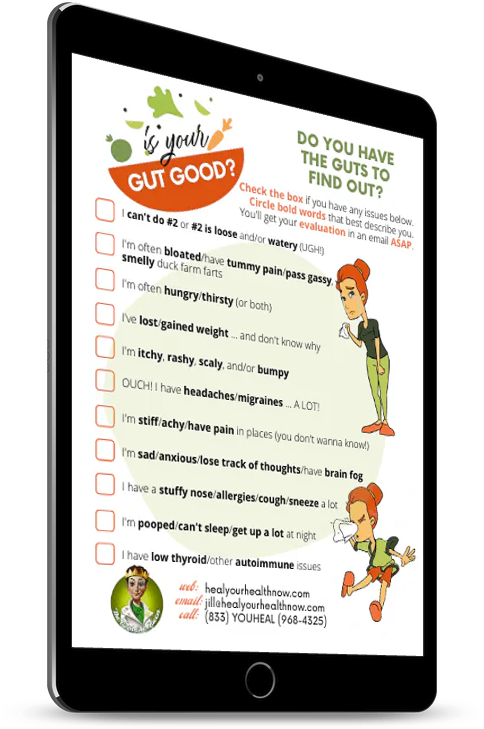By Dietitian Jill Place AKA The Queen of Leaky Gut
When I was very small and sick in bed, this mountain of a man would come to my house. Now, when you’re small, everyone adult seems like a mountain. But he was especially large.
And especially consoling for such a mountain … Dr. Walker was his name. He’d soothe my mother’s fears away by diagnosing what was wrong with me in a flash.
“She just has a cold,” he said. And, once my mother “ahhed” with relief, he’d pat me on the head, place a small hand-inscribed white box of round, white pills in my mother’s hand for my “cold”, and say “take two every four hours and call me in the morning”.
So when at least half a dozen people called ME this week insisting that they had “salicylate sensitivity”, I remembered Dr. Walker. And wondered if our early exposure to constantly seeking (and being soothed by) diagnoses has seeped into our consciousness from a very early age.
And is so all-consuming that we’re overflowing with the desire to name and claim what’s wrong with us to the exclusion of common sense and even sanity. Is it because the possibility of bad health news is so frightening that we have to control it in any way we can muster?
After all, figuring out what’s wrong with us is just a sharp “Google” click away. But I think we have taken all this a little too far.
Are We Brainwashed to Seek a Diagnosis for Our Ills?
So far that a prospective client called me just yesterday and tried to argue me into submission so that I would agree with her “Google” diagnosis of salicylate sensitivity. “I have these symptoms” (yet another vestige of the diagnosis conundrum … have a symptom … get a diagnosis … take a white pill), she said, “… fatigue … hives … migraine … asthma …” yadda yadda.
She also said she had bloating (not a common diagnosis for salicylate sensitivity), had “Googled” and done the diet program, and the bloating had gone away for the most part. So she knew it must be this particular diagnosis. I wondered why she called me if she knew definitively what was wrong with her.
I explained that I don’t deal in diagnoses … as a Functional Medicine practitioner, I instead deal in core health issues, like inflammation. And leaky gut … which causes inflammation. Inflammation can be the underlying cause of just about any dysfunction, including our top five maladies …, cancer, heart disease, respiratory problems, stroke, and Alzheimer’s.
As a matter of fact, a landmark cover story in Time Magazine almost 15 years ago was entitled “Inflammation: The Secret Killer”. It stated that “Inflammation is the body’s first defense against infection, but when it goes awry, it can lead to heart attacks, colon cancer, Alzheimer’s and a host of other diseases”.
The article was a big deal for the general public, but something that we alternative practitioners already knew. Ages ago.
It’s All About Reducing Inflammation …
And yet, even my food sensitivity colleagues will post on our listserve, “is LEAP (the name of our food sensitivity diet program … we use Mediator Release Testing to identify food sensitivities and LEAP to treat them) good for (name of disease) or good for (name of condition)”.
And the LEAP CEO more than once has said something back like (I’m paraphrasing), [click_to_tweet tweet=”“Don’t dwell on the diagnosis … this is all about reducing inflammation”.” quote=”“Don’t dwell on the diagnosis … this is all about reducing inflammation”.” theme=”style2″]
So if the Time article is right (and research more and more bears out the idea of inflammation as the ROOT cause for just about everything), we should be focusing on that … not only on diagnoses. Hey, I’m not knocking doctors, their processes, and the good work that they do. I work with them every day.
They fixed my shattered ankle and diagnosed my bleeding ulcer. The medication for the ulcer, however, gave me bad side effects. So I fixed it instead with supplements, changing my diet, (certain foods are pro-inflammatory … and you don’t have to “Google” them … you know what they are) and avoiding things like wine and coffee.
So Here’s What I Propose …
If you’re really interested in finding out what ails you, don’t “Google” a diagnosis. The symptoms my “prospective” client noted can be caused by any type of problem, especially those that are inflammation-related.
An anti-inflammatory diet might be a good idea … you can “Google” that, but it’s just common sense … more fruits and vegetables, especially colorful ones, more whole (not white, refined) grain products, more beans, more nuts, more healthy fats, such as coconut, olive, and other unrefined oils, avocado, and butter (the thoughts about fats are trending now toward traditional ones), and more fish.
And less processed and fast foods, especially those high in fat and sugar. One of the nurses I was working with just yesterday stood at the nurse’s station holding a Cup o’ Noodles and eating from a bag of chips. And I have to say that this is the norm rather than the exception.
Hey, I know that these things are convenient. But making a salad takes just five minutes more in my house. [click_to_tweet tweet=”Reducing inflammation really starts with diet” quote=”Reducing inflammation really starts with diet” theme=”style2″] … especially now in our fast-food, faster-choice times.
But … if an anti-inflammatory diet doesn’t make you feel better, don’t just reach for a diagnosis (although I’d never advise you not to see your doctor first).
Instead, do food sensitivity testing. Identifying sensitive foods and then systematically avoiding them can go a long way to reducing inflammation. And healing leaky gut.
Identifying Food Sensitivities Reduces Inflammation …
Here’s just one of the thousands of testimonials we LEAP people get … from someone with Multiple Sclerosis, which is thought to perhaps be an autoimmune disease … a condition in which your immune system “goes awry” and attacks your own cells as if they were foreign invaders.
Guess what … autoimmune diseases, which are on the rise, are also partially caused by inflammation. I was incredibly impressed when one of my LEAP colleagues wrote this about one of her patients … one that she was scared to take on because of her radical diagnosis (I’ve abbreviated and rewritten parts of this to make it my own) …
She came in … with being told that she will not be able to walk in few months … with dizziness, headache, hand numbness, right leg numbness. She was on multiple medications and supplements.
Her symptom survey (what we use to track LEAP program effectiveness instead of diagnosing disease) was low to begin with at 21 (I’ve seen it as high as the 150’s, but we tend to under-report symptoms as we become used to them over time) with swelling in tonsils, muscle aches, numbness, fatigue, and insomnia.
She came yesterday — with a symptom survey of ZERO … She kept saying — I have Nothing … nothing at all. I can walk and do everything …
Impressive, huh? I’ve got hundreds of success stories like these. I’m not saying that you shouldn’t see your doctor.
But I AM saying that, if inflammation and its accompanying symptoms (you CAN “google” those, but I caution you, the list is very long) seem to be plaguing you, that you might seek an anti-inflammatory solution too.


Leave a Reply